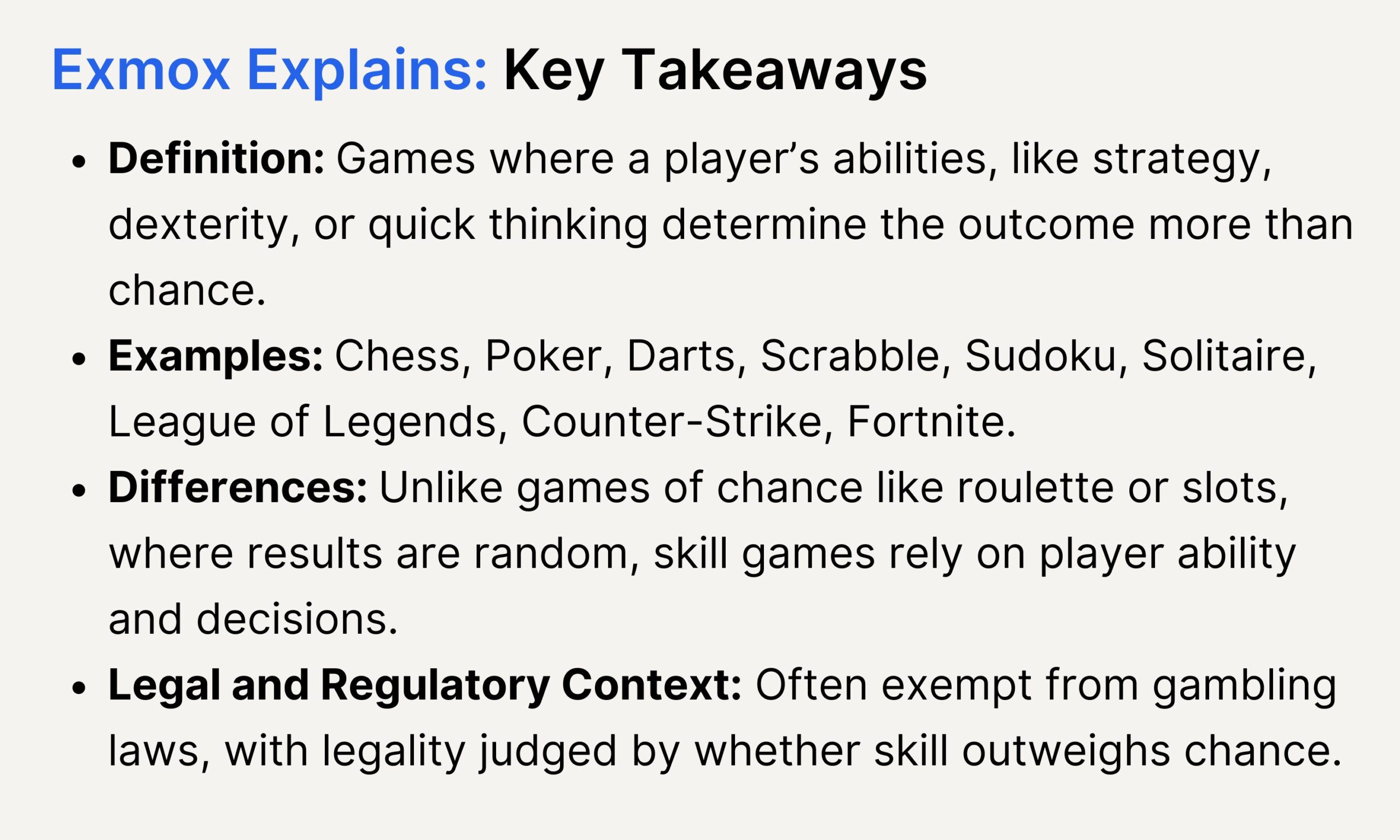Exmox Explains
What are Skill Games?
Skill games, or skill-based games, are those in which a player’s physical or mental abilities such as strategy, dexterity, knowledge, or quick decision-making play the primary role in determining the outcome, rather than chance or luck. These games are intentionally structured to minimize unpredictable variables, meaning players who practice and refine their skills tend to perform better and win more consistently.

Examples of Skill Games:
Skill games come in both traditional and digital formats. Board games like chess and Go demand strategic thinking and foresight, while poker, though it involves some chance, rewards players who master probability, psychology, and betting strategies.
Physical games such as darts rely on hand-eye coordination and precision, and word games like Scrabble challenge a player’s vocabulary and resource management. Trivia games, such as Jeopardy! or pub quizzes, test general knowledge and recall speed. Puzzle games like sudoku emphasize logical reasoning, and mobile apps like Solitaire Smash or Solitaire Cash combine pattern recognition with speed.
In the digital space, esports titles such as League of Legends, Counter-Strike, StarCraft, and Fortnite require rapid decision-making, strategic planning, and refined motor skills. Across all these formats, success depends on practice, learning, and skill development.
How Do Skill Games Differ from Games of Chance?
Unlike games of chance such as roulette or slot machines, where outcomes are driven by randomness, skill games depend on the player’s abilities and decisions. In pure skill games, like chess, there are no random elements; every outcome results directly from the players’ actions, strategies, and decisions within the framework of the game’s rules.
Why Skill Games Are Popular
Skill games appeal to those who enjoy challenge, growth, and fair competition. They offer players the opportunity to improve over time and be rewarded for effort, knowledge, and mastery providing a sense of control and accomplishment not typically found in games of chance.
Legal and Regulatory Context of Skill Games
The distinction between skill games and games of chance has important legal implications, especially in the context of gambling regulation. In many jurisdictions, skill games are not considered gambling and are therefore not subject to the same restrictions.
Courts and regulators often use tests such as the “dominant factor” test to assess whether skill primarily determines a game’s outcome. If so, the game may be legally offered, even with real-money stakes. However, legal interpretations vary: while games like chess and trivia are almost universally recognized as skill-based, games like poker or fantasy sports may fall into legal gray areas depending on local laws. As a result, the classification and legality of skill games can differ widely across regions, making regulatory compliance critical for platforms, developers, and users.
Frequently Asked Questions
What is the main difference between skill games and games of chance?
Skill games rely primarily on a player’s abilities, such as strategy, problem-solving, reflexes, or knowledge, to determine the outcome. In contrast, games of chance, like slot machines or roulette, are based on random events, leaving little or no control to the player.
Can I make money by playing skill games?
Yes, some skill games offer opportunities to earn money. For example, competitive games like poker, esports tournaments, or online skill-based platforms provide cash prizes or rewards for top performers. However, success in these games depends on your skill level, practice, and ability to compete effectively.
What are some beginner-friendly skill games?
If you’re new to skill games, consider starting with simple and accessible options like Solitaire Cash, Solitaire Smash, Blitz – Win Cash or word games (e.g., Scrabble), or trivia games. These games are easy to learn but still challenge your cognitive abilities, making them a great starting point for building skills and confidence.